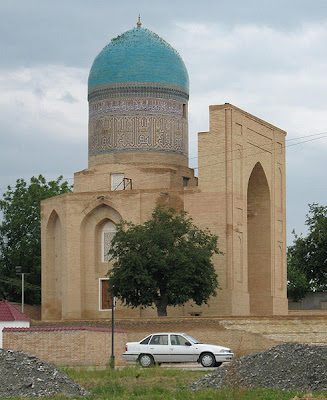Wednesday, April 13, 2011
Samarkand The Land of Scientists
Wednesday, April 13, 2011 by Yasser Abo El Ella
Samarkand is the second biggest city of Republic of Uzbekistan and among as is age as Rome, Athens and Babylon- more than twenty-five centuries old. Ancient Arabian manuscripts refer to it as the “jewel of the East”, Europeans called it the “The Land of Scientists”. An impressive and beautiful city, Samarkand is the city of legends. When Alexander the Great 1st time saw Samarcand, he exclaimed “ I heard that the city was beautiful but never thought that it could be so beautiful and impressive”.
Based around 700 B.C. From the Sogdians, Samarkand has been among the primary centres of Persian civilisation from its youth. It was already the capital of the Sogdian under the Achaemenid dynasty of Persia once Alexander the Great appropriated it in 329 B.C. . The Greeks adverted to Samarkand as Maracanda.
From the sixth to the thirteenth century it grew larger and more inhabited than New Samarkand and was commanded by the Western Turks, Arabs (who converted the area to Islam , Persian Samanids, Kara-Khanid Turks, Seljuk Turks , Kara-Khitan , and Khorezmshah before being sacked by the Mongols under Genghis Khan in 1220. A little part of the population survived, but Samarkand hurt at the least one other Mongolian sack by Khan Baraq to get treasure he asked to pay an army with. The town took a lot of decades to go back from these tragedies.
In 1500 the Republic of Uzbekistan Turks took charge of Samarkand. The Shaybanids emerged as the Uzbek leadership at or about this time.
The city got under Russian rule after the citadel had been taken by a force below Colonel Konstantinovich Petrovich Kaufman in 1868.
In 1886 the city turned the capital of the freshly formed Samarkand Oblast of Russian Turkistan and developed in importance still additional when the Trans-Caspian railroad reached the city in 1888. It became the capital of the Uzbak SSR in 1925 before being replaced by Taskent in 1930.
The foursquare is traced on the 3 sides by sparkling and greenish blue covered buildings Ulugbek madrasa, Sherdor and Tilla Qori. Madrasa in Arabic language means The mediaeval universities. Inferior and outside facades of the madrassah are decorated with beautify of glazed brick, mosaic and carven marble. The foursquare is believed an architectural jewel representing the best in Islamic Art.
The additional historic site is Mausoleum of Tamerlane, among the magisterial conquerors in history, who earned Samarkand beloved by poets and travelers. The majesty of architectural forms and lines and colorful mosaic designs make this mausoleum a unique monument of medieval architecture. the famous blue ribbed cantaloupe dome of mausoleum rises over the tin roof-tops in central Samarkand. A massive slab of green jade, under which Tamerlane was laid is said to be the largest such stone in the world.









Tags:
Asia continent ,
Uzbekistan
 |
| Sherdar Medressa, Lions gate |
Based around 700 B.C. From the Sogdians, Samarkand has been among the primary centres of Persian civilisation from its youth. It was already the capital of the Sogdian under the Achaemenid dynasty of Persia once Alexander the Great appropriated it in 329 B.C. . The Greeks adverted to Samarkand as Maracanda.
From the sixth to the thirteenth century it grew larger and more inhabited than New Samarkand and was commanded by the Western Turks, Arabs (who converted the area to Islam , Persian Samanids, Kara-Khanid Turks, Seljuk Turks , Kara-Khitan , and Khorezmshah before being sacked by the Mongols under Genghis Khan in 1220. A little part of the population survived, but Samarkand hurt at the least one other Mongolian sack by Khan Baraq to get treasure he asked to pay an army with. The town took a lot of decades to go back from these tragedies.
 |
| Guri Amir Mausoleum |
In 1500 the Republic of Uzbekistan Turks took charge of Samarkand. The Shaybanids emerged as the Uzbek leadership at or about this time.
The city got under Russian rule after the citadel had been taken by a force below Colonel Konstantinovich Petrovich Kaufman in 1868.
In 1886 the city turned the capital of the freshly formed Samarkand Oblast of Russian Turkistan and developed in importance still additional when the Trans-Caspian railroad reached the city in 1888. It became the capital of the Uzbak SSR in 1925 before being replaced by Taskent in 1930.
The additional historic site is Mausoleum of Tamerlane, among the magisterial conquerors in history, who earned Samarkand beloved by poets and travelers. The majesty of architectural forms and lines and colorful mosaic designs make this mausoleum a unique monument of medieval architecture. the famous blue ribbed cantaloupe dome of mausoleum rises over the tin roof-tops in central Samarkand. A massive slab of green jade, under which Tamerlane was laid is said to be the largest such stone in the world.
Subscribe to:
Post Comments (Atom)









7 Responses to “Samarkand The Land of Scientists”
April 22, 2011 at 2:57 AM
Samarkand is really beautiful and impressive city to visit.it got of a lot heritage and history. enjoy this summer season with Samarkand.
murree hotels
October 9, 2011 at 8:34 AM
nice photo
November 3, 2011 at 10:47 AM
lovely blog
November 3, 2011 at 10:48 AM
nice blog
January 26, 2012 at 6:42 AM
السلام عليكم ورحمة الله وبركاته جزاكم الله خيرا على هذا الموضوع الجميل ** بجد موضوع جميل ومشوق... بارك الله فيكم يا شباب
August 16, 2012 at 2:51 AM
Hello. I started to write a blog about traveling, music, fashion and many others. It would be nice, if you'll visit me sometimes :)
www.thevanityvisa.blogspot.com
September 12, 2012 at 2:59 AM
He conquered Transoxiana, Bukhara (Uzbekistan) and Samarkand. ... ruler of vast swaths of land from the Caspian Sea all the way to Korea.
Post a Comment